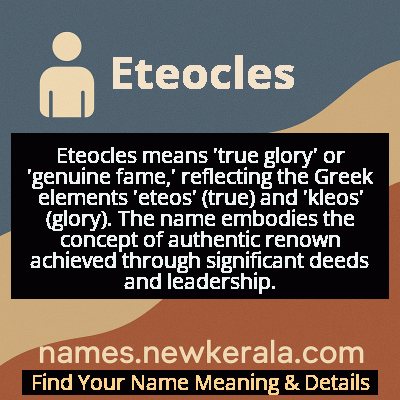Eteocles Name Meaning & Details
Origin, Popularity, Numerology Analysis & Name Meaning of Eteocles
Discover the origin, meaning, and cultural significance of the name ETEOCLES. Delve into its historical roots and explore the lasting impact it has had on communities and traditions.
Name
Eteocles
Gender
Male
Origin
Greek
Lucky Number
3
Meaning of the Name - Eteocles
Eteocles means 'true glory' or 'genuine fame,' reflecting the Greek elements 'eteos' (true) and 'kleos' (glory). The name embodies the concept of authentic renown achieved through significant deeds and leadership.
Eteocles - Complete Numerology Analysis
Your Numerology Number
Based on Pythagorean Numerology System
Ruling Planet
Jupiter
Positive Nature
Optimistic, inspirational, and creative.
Negative Traits
Scattered, exaggerating.
Lucky Colours
Yellow, gold, purple.
Lucky Days
Thursday.
Lucky Stones
Yellow sapphire.
Harmony Numbers
1, 2, 9.
Best Suited Professions
Arts, writing, communication.
What People Like About You
Creativity, optimism.
Famous People Named Eteocles
Eteocles of Thebes
Mythological King
Central figure in the Seven Against Thebes conflict and alternating ruler of Thebes
Eteocles (Historical Figure)
Ancient Greek Statesman
Recorded as a significant Theban leader during the Persian Wars era
Eteocles of Sparta
Military Commander
Commanded Spartan military operations during the Classical period
Name Variations & International Equivalents
Click on blue names to explore their detailed meanings. Gray names with will be available soon.
Cultural & Historical Significance
Beyond mythology, Eteocles has influenced Western literary and philosophical traditions as a symbol of political complexity and moral ambiguity. His character raises enduring questions about the nature of leadership, the conflict between personal ambition and civic duty, and the inescapability of familial curses. The name continues to resonate in classical studies, modern adaptations of Greek tragedy, and philosophical discussions about power dynamics and ethical leadership in political systems.
Extended Personality Analysis
The name Eteocles suggests a personality marked by strong leadership qualities, determination, and a profound sense of responsibility. Individuals with this name are often perceived as natural leaders who take their duties seriously, whether in professional, familial, or social contexts. They tend to be strategic thinkers with a clear vision, though this can sometimes manifest as stubbornness or inflexibility when their authority is questioned. The mythological association lends an air of tragic nobility—suggesting someone who may achieve great things but faces significant internal and external conflicts.
Historically linked to the Theban king, the name carries connotations of political savvy and protective instincts, but also hints at potential flaws related to pride and the inability to compromise. Those named Eteocles might exhibit a strong territorial sense about their responsibilities and domains, combined with a complex moral compass that balances noble intentions with human vulnerabilities. The legacy suggests a personality that commands respect but may struggle with the weight of expectations and the challenge of balancing multiple competing loyalties.
Modern Usage & Popularity
In contemporary naming practices, Eteocles remains an uncommon choice, primarily selected by parents with strong connections to classical education, Greek heritage, or mythological interests. The name maintains a steady but minimal presence in Greece and among Greek diaspora communities, though it has never achieved widespread popularity. Its usage is typically deliberate and meaningful rather than following naming trends, often chosen for its deep cultural resonance and intellectual appeal. While not appearing on mainstream baby name charts, Eteocles continues to be recognized in academic and literary circles, preserving its connection to one of Greek mythology's most compelling tragic figures.
Symbolic & Spiritual Meanings
Symbolically, Eteocles represents the complex interplay between leadership and tragedy, embodying the Greek concept of the hero with a fatal flaw. His name has come to symbolize the inevitable conflict between duty and desire, between maintaining power and honoring agreements. The story of Eteocles serves as a metaphor for civil war, political ambition, and the destructive potential of familial discord when personal interests override communal harmony. His legacy symbolizes the price of leadership and the tragic consequences that can arise when principles become inflexible and compromise becomes impossible.

